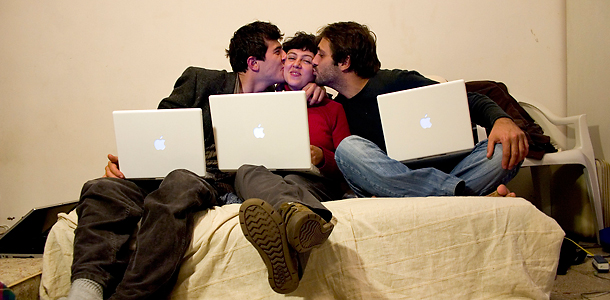Internet users--Facebookers most of all--are a trusting bunch. Why? Because we are wired to build relationships around trust.
Fast CompanyBY Adam PenenbergToday
 [Image: Flickr user Capitan Giona]
[Image: Flickr user Capitan Giona]The most surprising takeaway from the recent Pew Research Center study, "Social Networking Sites and Our Lives," … [is] the idea that the Internet, in particular social networks, engender trust, and the more time you spend on them the more trusting you become.
 Image via CrunchBaseAs the report put it, "The typical Internet user is more than twice as likely as others to feel that people can be trusted," with regular Facebook users the most trusting of all. "…
Image via CrunchBaseAs the report put it, "The typical Internet user is more than twice as likely as others to feel that people can be trusted," with regular Facebook users the most trusting of all. "… Image via WikipediaThis has significant implications, because … trust goes to the heart of our economic and social systems. Neuroeconomist Paul J. Zak, a professor at Claremont College and author of the forthcoming book, The Moral Molecule: Vampire Economics and the New Science of Good and Evil, says that trust is the lubricant that makes economic transactions possible. … While it may say "In God We Trust" on every dollar bill, what we are really trusting is that this piece of paper or coin--nowadays often a digital representation on a screen--is worth what we all believe it's worth.
Image via WikipediaThis has significant implications, because … trust goes to the heart of our economic and social systems. Neuroeconomist Paul J. Zak, a professor at Claremont College and author of the forthcoming book, The Moral Molecule: Vampire Economics and the New Science of Good and Evil, says that trust is the lubricant that makes economic transactions possible. … While it may say "In God We Trust" on every dollar bill, what we are really trusting is that this piece of paper or coin--nowadays often a digital representation on a screen--is worth what we all believe it's worth. In his own research, Zak and a co-researcher found that nations with higher levels of trust (Sweden, Germany, the U.S.) have stronger economies than those on the other end of the spectrum (the Congo, Sudan, Colombia). …
… We humans are hard-wired to commingle with one another offline and on-, and the web and its platforms like Facebook and Twitter make it more efficient than ever. …
 Image via WikipediaZak has traced much of our behavior to oxytocin, a single neuropeptide he's dubbed "the moral molecule" because it appears to shape much of our better nature. Also referred to as the "cuddle hormone," oxytocin is the same chemical that forges that unshakeable bond between nursing mothers and their babies. … [In] a spate of experiments spanning a decade Zak has linked oxytocin to all manner of human behavior--from empathy to generosity to trust. And when we believe that someone trusts us, we trust them back, and this alters our behavior: It makes us more generous, for one. Ultimately, oxytocin is, Zak says, the "social glue" that adheres families, communities, and societies while simultaneously acting as an "economic lubricant" that enables us to engage in all sorts of transactions.
Image via WikipediaZak has traced much of our behavior to oxytocin, a single neuropeptide he's dubbed "the moral molecule" because it appears to shape much of our better nature. Also referred to as the "cuddle hormone," oxytocin is the same chemical that forges that unshakeable bond between nursing mothers and their babies. … [In] a spate of experiments spanning a decade Zak has linked oxytocin to all manner of human behavior--from empathy to generosity to trust. And when we believe that someone trusts us, we trust them back, and this alters our behavior: It makes us more generous, for one. Ultimately, oxytocin is, Zak says, the "social glue" that adheres families, communities, and societies while simultaneously acting as an "economic lubricant" that enables us to engage in all sorts of transactions.  Image via CrunchBaseI wrote about Zak last year in a feature titled "Doctor Love" for Fast Company, and in addition to participating in a series of studies he conducted, I had him gin up one just for me. … I theorized it would also affect a person engaging on Facebook and Twitter. … So Zak took my blood, I got on Twitter for 10 minutes, then he took it again, then compared to the two samples. In those intervening 10 minutes my levels of oxytocin had risen 13.2%--as much as a groom at a wedding. (My wife: "That's pathetic.")
Image via CrunchBaseI wrote about Zak last year in a feature titled "Doctor Love" for Fast Company, and in addition to participating in a series of studies he conducted, I had him gin up one just for me. … I theorized it would also affect a person engaging on Facebook and Twitter. … So Zak took my blood, I got on Twitter for 10 minutes, then he took it again, then compared to the two samples. In those intervening 10 minutes my levels of oxytocin had risen 13.2%--as much as a groom at a wedding. (My wife: "That's pathetic.") Subsequently Zak traveled to Korea and redid my tweeting experiment, this time with three journalists using Facebook. The result: They all demonstrated increased levels of oxytocin. …
 Image via Wikipedia… [The] Pew study found "little validity to concerns that people who use [social networks] experience smaller social networks, less closeness, or are exposed to less diversity." On the contrary, Americans "have more close social ties than they did two years ago," and "are less socially isolated."
Image via Wikipedia… [The] Pew study found "little validity to concerns that people who use [social networks] experience smaller social networks, less closeness, or are exposed to less diversity." On the contrary, Americans "have more close social ties than they did two years ago," and "are less socially isolated." And it all comes down to trust. For this, you can thank the oxytocin in your brain.
Adam L. Penenberg is a journalism professor at NYU and a contributing writer to Fast Company. Follow him on Twitter: @penenberg.







No comments:
Post a Comment